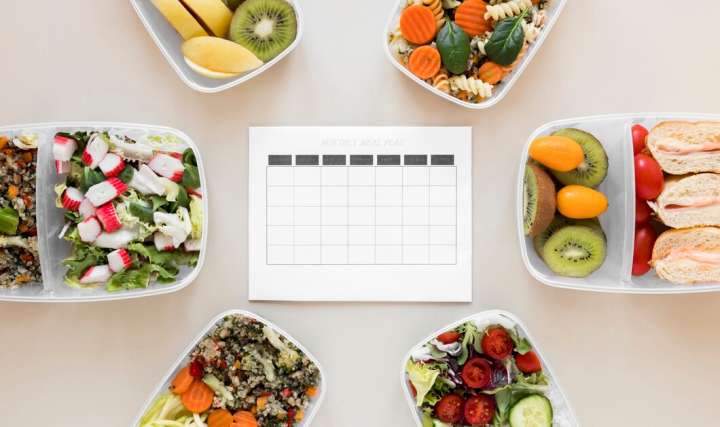Adopting a vegetarian diet is a powerful way to embark on a journey towards healthier living and effective weight loss. A well-structured 30-day vegetarian meal plan can help you shed pounds while providing your body with the essential nutrients it needs. By focusing on plant-based foods, you can enjoy a diverse range of delicious meals that support your weight loss goals without feeling deprived.
Why Choose a Vegetarian Diet for Weight Loss?
Nutrient-Dense and Low in Calories
Vegetarian diets are often rich in fruits, vegetables, whole grains, legumes, nuts, and seeds. These foods are packed with essential vitamins, minerals, and antioxidants, and they tend to be lower in calories compared to animal-based foods. This means you can eat satisfying portions without consuming excessive calories.
High in Fiber
Fiber is a key component of a successful weight loss plan. It aids in digestion, helps regulate blood sugar levels, and keeps you feeling full for longer periods. Many plant-based foods, such as beans, lentils, vegetables, and whole grains, are high in fiber, making them perfect for a vegetarian weight loss plan.
Reduced Saturated Fat
Animal products are often high in saturated fat, which can contribute to weight gain and other health issues. A vegetarian diet naturally limits your intake of saturated fat, particularly when you focus on whole, unprocessed plant foods. This can lead to a reduction in overall calorie intake and support weight loss.
Key Components of a 30-Day Vegetarian Meal Plan
Balanced Macronutrients
For effective weight loss, it’s important to balance your intake of macronutrients—carbohydrates, proteins, and fats. Each meal should include a mix of these to ensure you’re getting the energy and nutrients your body needs.
- Carbohydrates: Opt for complex carbohydrates like quinoa, brown rice, sweet potatoes, and oats. These provide sustained energy and help keep you full.
- Proteins: Incorporate plant-based protein sources such as beans, lentils, tofu, tempeh, and chickpeas. These are essential for muscle repair and growth.
- Fats: Healthy fats are crucial for overall health. Include sources like avocados, nuts, seeds, and olive oil in your meals.
Portion Control
While vegetarian foods can be lower in calories, portion control is still essential for weight loss. Pay attention to serving sizes and avoid overeating, even with healthy foods. Use smaller plates, measure portions, and listen to your body’s hunger cues.
Meal Planning and Preparation
Planning and preparing your meals in advance can help you stay on track with your vegetarian weight loss plan. Set aside time each week to plan your meals, create a shopping list, and prepare ingredients. This reduces the temptation to reach for unhealthy convenience foods.
Sample Vegetarian Meal Ideas
Breakfast
- Smoothie Bowl: Blend spinach, banana, frozen berries, and almond milk. Top with granola, chia seeds, and sliced almonds.
- Overnight Oats: Mix rolled oats with almond milk, chia seeds, and a drizzle of maple syrup. Let it sit overnight and top with fresh fruit in the morning.
- Avocado Toast: Spread mashed avocado on whole-grain toast and top with cherry tomatoes, a sprinkle of salt, and a dash of red pepper flakes.
Lunch
- Quinoa Salad: Combine cooked quinoa with black beans, corn, bell peppers, red onion, and cilantro. Toss with lime juice and olive oil.
- Veggie Wrap: Fill a whole-grain wrap with hummus, spinach, shredded carrots, cucumber, and roasted red peppers.
- Lentil Soup: Cook lentils with diced tomatoes, carrots, celery, onions, garlic, and vegetable broth. Season with cumin and paprika.
Dinner
- Stuffed Bell Peppers: Fill bell peppers with a mixture of brown rice, black beans, corn, diced tomatoes, and spices. Bake until tender.
- Chickpea Curry: Simmer chickpeas with coconut milk, diced tomatoes, spinach, and curry powder. Serve over brown rice or quinoa.
- Vegetable Stir-Fry: Sauté a variety of vegetables like broccoli, bell peppers, snap peas, and carrots in olive oil. Add tofu and a splash of soy sauce, and serve over brown rice.
Snacks
- Fruit and Nut Mix: Combine dried fruits like apricots and raisins with nuts such as almonds and walnuts.
- Veggie Sticks with Hummus: Cut up carrots, cucumbers, and bell peppers, and dip them in hummus.
- Greek Yogurt with Berries: Opt for a plant-based Greek yogurt alternative and top with fresh or frozen berries.
Tips for Success
Stay Hydrated
Drinking enough water is crucial for weight loss and overall health. It helps with digestion, keeps your skin looking great, and can even curb hunger. Aim for at least eight glasses of water a day, and consider drinking a glass before meals to help control your appetite.
Be Mindful of Hidden Calories
Even healthy foods can add up in calories if you’re not careful. Watch out for high-calorie dressings, sauces, and toppings. Opt for lighter versions or make your own at home.
Incorporate Exercise
While diet is a significant part of weight loss, incorporating regular physical activity can enhance your results. Aim for a mix of cardio, strength training, and flexibility exercises. Even simple activities like walking, yoga, or biking can make a big difference.
Monitor Your Progress
Keep track of your meals, physical activity, and how you feel throughout the 30 days. This can help you identify what works best for you and make any necessary adjustments. Consider keeping a journal or using a mobile app to log your progress.
Seek Support
Embarking on a weight loss journey can be challenging, but you don’t have to do it alone. Seek support from friends, family, or online communities. Sharing your goals and progress with others can provide motivation and accountability.
Conclusion
A 30-day vegetarian meal plan for weight loss is an excellent way to improve your health, shed unwanted pounds, and enjoy a variety of delicious, nutrient-dense foods. By focusing on balanced meals, portion control, and regular physical activity, you can achieve your weight loss goals while feeling satisfied and energized. Remember, the key to success is consistency and making sustainable changes that you can maintain long-term. Embrace the journey and enjoy the benefits of a healthier, vegetarian lifestyle.

